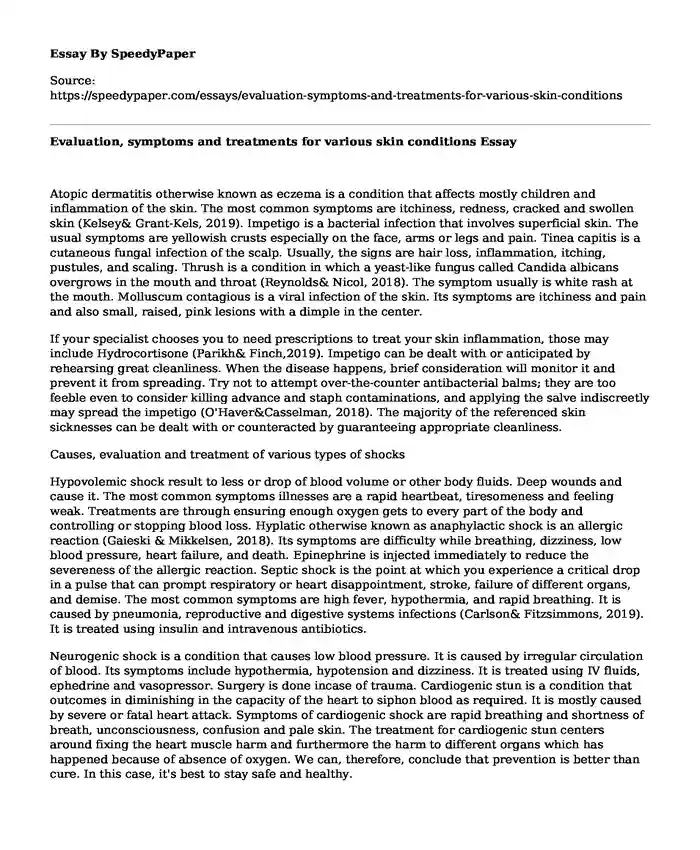
| Essay type: | Evaluation essays |
| Categories: | Psychology Economics Finance Literature Research |
| Pages: | 3 |
| Wordcount: | 597 words |
Atopic dermatitis otherwise known as eczema is a condition that affects mostly children and inflammation of the skin. The most common symptoms are itchiness, redness, cracked and swollen skin (Kelsey& Grant-Kels, 2019). Impetigo is a bacterial infection that involves superficial skin. The usual symptoms are yellowish crusts especially on the face, arms or legs and pain. Tinea capitis is a cutaneous fungal infection of the scalp. Usually, the signs are hair loss, inflammation, itching, pustules, and scaling. Thrush is a condition in which a yeast-like fungus called Candida albicans overgrows in the mouth and throat (Reynolds& Nicol, 2018). The symptom usually is white rash at the mouth. Molluscum contagious is a viral infection of the skin. Its symptoms are itchiness and pain and also small, raised, pink lesions with a dimple in the center.
If your specialist chooses you to need prescriptions to treat your skin inflammation, those may include Hydrocortisone (Parikh& Finch,2019). Impetigo can be dealt with or anticipated by rehearsing great cleanliness. When the disease happens, brief consideration will monitor it and prevent it from spreading. Try not to attempt over-the-counter antibacterial balms; they are too feeble even to consider killing advance and staph contaminations, and applying the salve indiscreetly may spread the impetigo (O'Haver&Casselman, 2018). The majority of the referenced skin sicknesses can be dealt with or counteracted by guaranteeing appropriate cleanliness.
Causes, evaluation and treatment of various types of shocks
Hypovolemic shock result to less or drop of blood volume or other body fluids. Deep wounds and cause it. The most common symptoms illnesses are a rapid heartbeat, tiresomeness and feeling weak. Treatments are through ensuring enough oxygen gets to every part of the body and controlling or stopping blood loss. Hyplatic otherwise known as anaphylactic shock is an allergic reaction (Gaieski & Mikkelsen, 2018). Its symptoms are difficulty while breathing, dizziness, low blood pressure, heart failure, and death. Epinephrine is injected immediately to reduce the severeness of the allergic reaction. Septic shock is the point at which you experience a critical drop in a pulse that can prompt respiratory or heart disappointment, stroke, failure of different organs, and demise. The most common symptoms are high fever, hypothermia, and rapid breathing. It is caused by pneumonia, reproductive and digestive systems infections (Carlson& Fitzsimmons, 2019). It is treated using insulin and intravenous antibiotics.
Neurogenic shock is a condition that causes low blood pressure. It is caused by irregular circulation of blood. Its symptoms include hypothermia, hypotension and dizziness. It is treated using IV fluids, ephedrine and vasopressor. Surgery is done incase of trauma. Cardiogenic stun is a condition that outcomes in diminishing in the capacity of the heart to siphon blood as required. It is mostly caused by severe or fatal heart attack. Symptoms of cardiogenic shock are rapid breathing and shortness of breath, unconsciousness, confusion and pale skin. The treatment for cardiogenic stun centers around fixing the heart muscle harm and furthermore the harm to different organs which has happened because of absence of oxygen. We can, therefore, conclude that prevention is better than cure. In this case, it's best to stay safe and healthy.
References
Carlson, B., & Fitzsimmons, L. (2019). Shock, Sepsis, and Multiple Organ Dysfunction Syndrome. Priorities in Critical Care Nursing, 474.Gaieski, D. F., & Mikkelsen, M. E. (2018). Evaluation of and initial approach to the adult patient with undifferentiated hypotension and shock. Waltham, MA. Accessed on, 8(17), 16.
Kelsey, A., Parikh, S. A., Finch, J., & Grant-Kels, J. M. (2019). Skin Health and Healthy Aging: Skin Disease. In Healthy Aging (pp. 115-132). Springer, Cham.Skin Conditions. (n.d.). Symptoms in the Pharmacy, 138-187. doi:10.1002/9781444300611.ch3
Cite this page
Evaluation, symptoms and treatments for various skin conditions. (2022, Dec 20). Retrieved from https://speedypaper.net/essays/evaluation-symptoms-and-treatments-for-various-skin-conditions
Request Removal
If you are the original author of this essay and no longer wish to have it published on the SpeedyPaper website, please click below to request its removal:
- Free Essay on the Documentary: The Drug Culture - How to Counter It
- Christmas in Australia, Free Essay for Students
- Pilates Exercise Feet in Straps on the Reformer. Free Essay Example.
- Rhetorical Essay on Graphic Novel, "Superman Red Son"
- Free Essay About The First Intifada
- Identity On The Basis Of Gender And Social Conflicts
- Financial Research Report of Home Depot Inc. Paper Example
Popular categories




